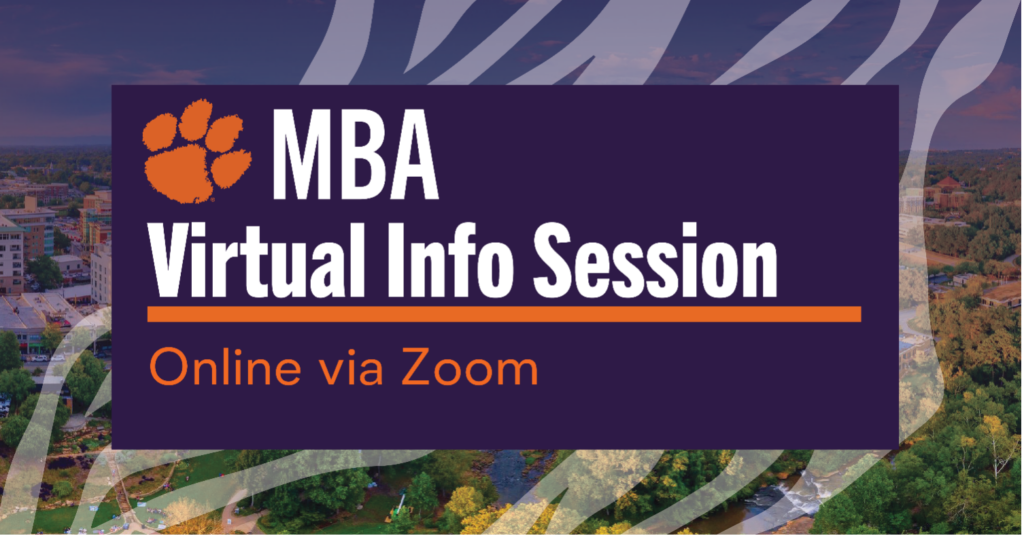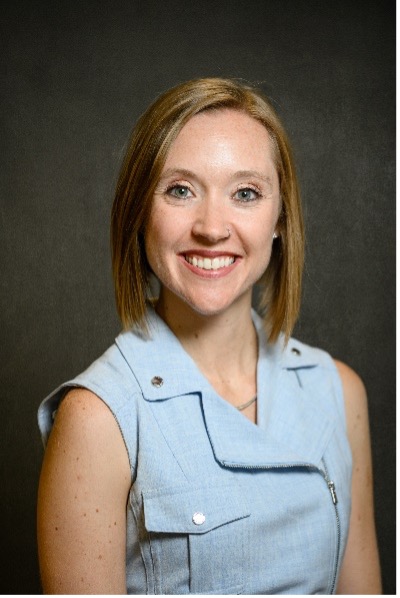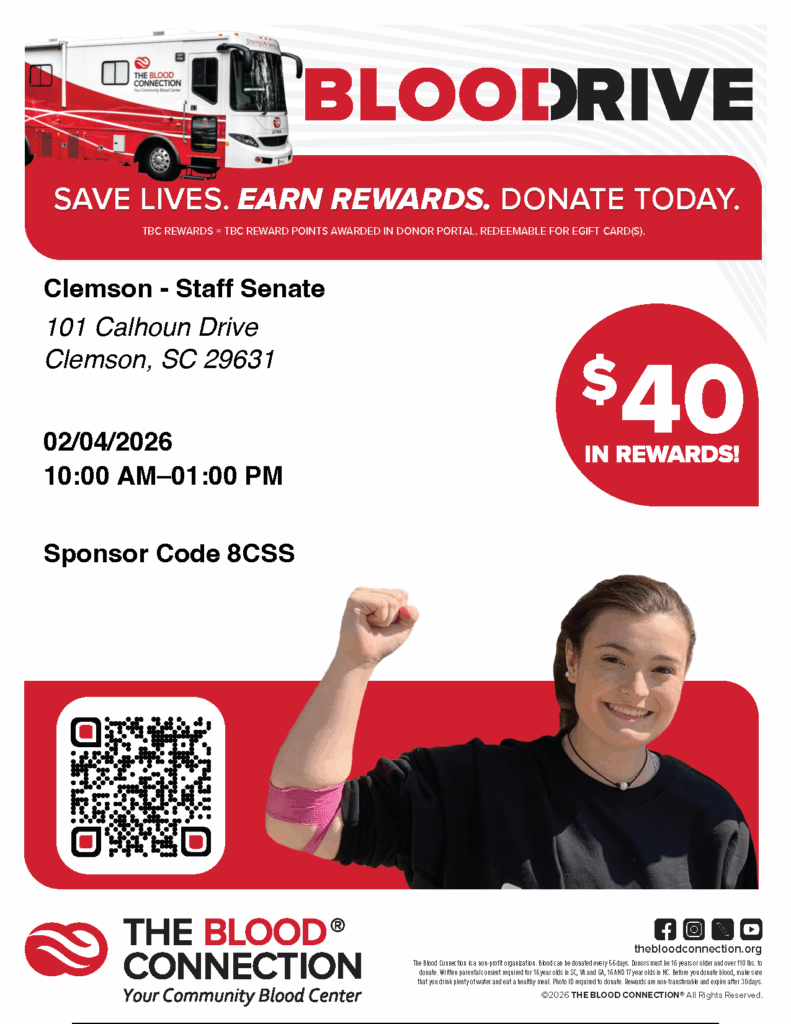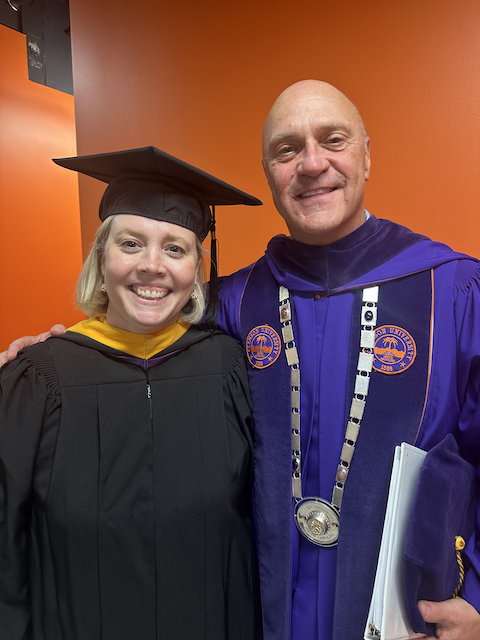In today’s newsletter, Staff Senate President Stacey Miller provides her latest report. Plus, the Staff Senate Golf Tournament is back for another round, the latest Ombuds Report, First Aid/CPR classes from Campus Recreation and more!
Clemson University Staff Senate
MBA Virtual Information Session set for March 10

Interested in advancing your career with a Clemson MBA? Discover Clemson University’s flexible MBA options and learn more about the ETAP benefits available exclusively to Clemson employees. Attend our upcoming Information Session on Tuesday, March 10, schedule a one-on-one meeting with our Admissions Team at a time that works best for you or email mbaprogram@clemson.edu to explore additional options. Those interested may access the admission application.
Ombuds Report: February 2026 – You’re Doing Fine: Relieving the Achievement Pressure

It’s the second month of the new year. Did you set New Year’s resolutions this year? Did you keep them? I do not set resolutions every year, but I have successfully set and kept them in the past. However, none of my resolutions were achieved without the accompanying shame and anxiety about how I would feel if I were to join the millions of others who abandon their resolutions by the second Friday in January. In other words, I have kept resolutions when the achievement was not the resolution itself but only the avoidance of failure.
When lamenting this tension recently, a friend told me she doesn’t count her January productivity toward her work or life projects at all. She does what she needs to do to get her job done, but if she has broader goals, such as “learn a language,” “write a novel,” or “lose weight,” she gives herself the month of January to be okay with her status quo, rather than striving for more. She looks at other months for productivity and achievement.
I was intrigued. My friend’s decision to only begin “counting” her productivity on February 1 made me think about seasons when we just need to sit back and survive. Staff at Clemson have been through a lot lately: leadership changes, ERP improvements, political shifts, financial mayhem, to name only a few. Maintaining our productivity and professionalism while handling so much change is an achievement in itself.
My No.1 strength in StrengthsFinder is “Achiever,” which I often find to be a burden, pushing me to strive more and rest never. Because of this “strength,” if I decide to call it that, I’m one of those people who need to have tiered goals: A big one that will take years, then something that will take this year, this semester, this month, this week, this day. Right now, my big goal is working on my PhD. But rather than a year-long or semester-long goal, what if I give myself permission to just get by?
I’m not advocating that we spurn productivity or stop trying. Caring about this place and pouring our hearts into our work is what makes this university run. But I found my productivity to be somewhat counterintuitive: When I gave myself permission to take a little break from the achievement grind, I was more productive than ever, without the fear or shame I’m used to. I actually made a personal breakthrough and started working on a project I had dreamed about for years and kept putting off, waiting until there was a lull in everything else in my life. That lull is not coming! I needed to create it for myself.
I’ve also started putting important but easily ignored things on my weekly to-do list: figure out what self-care I need, take a walk outside, spend uninterrupted time with my kids, have a conversation with my husband that does not involve logistics of feeding and housing and transporting these children. As someone guided by lists, when there is a place for a checkmark by these, I’m much more likely to see them as something to achieve and find fulfillment in.
So let me just say this: You’re doing fine. I’m doing fine. We’ll get through these seasons of change, and that can be our big achievement for 2026.
Box No.1:
What is the Ombuds Office?
The Ombuds Office is a confidential, independent, neutral, and informal space for staff to process concerns, get information, and develop options for how to move forward in a difficult situation. I can provide education, conflict coaching, mediation, and facilitation as well as referrals to other resources across Clemson. If you are unsure how to move forward in any way, I can help you work through it.
Tessa Byer
Phone: 864-656-5353
Email: tbyer@clemson.edu
Address: 135 Old Greenville Hwy, Ste. 203 (Next to Esso!)
Box No. 2:
Save the date for upcoming trainings offered by the Ombuds:
Teamwork that Works
February 26, 2026, from 12:00 to 1:00
Virtually only, sign up here:
Combating Burnout and Cultivating Resilience
March 6, 2026, from 9:00 to 11:00
Virtually only
Navigating Intergenerational Workplaces
April 10, 2026, from 9:00 to 11:00
In person at University Facilities Center, sign up here:
February 2026: Letter from the Staff Senate President

Dear Fellow Staff,
I hope this year is off to a great start, and you were able to enjoy the snow. Fun fact: Did you know that February is the mid-point between the winter solstice and spring equinox – sunny days are ahead.
So, what have Staff Senators been up to during the first couple of months of 2026? We welcomed Interim President Jones at our January Staff Senate Meeting, engaged in conversations with the B.O.T. members regarding the Presidential Search, sponsored a blood drive where we collected 23 units of blood (thank you all who came out to donate), put out a call within Staff Senate for officer elections, geared up for Senator elections, and planning the Battle of the Senates, and the next Staff Senate Golf tournament to help raise funds for the Employee Emergency Fund and Endowment.
We have an exciting lineup for this month’s Staff Senate meeting. We hope you can attend.
a) Cole Smith, Executive Vice President for Academic Affairs and Provost
b) Rick Petillo, Sr. Vice President & CFO, Finance & Operations
c) Heather Humphreys, Executive Compensation Consultant, HR
d) Jamie Jasperson, Training Lead – Director of Curriculum Delivery, Workday
e) Dan Hofmann, Director of Parking and Transportation Services
Elections are upon us. If you have ever considered getting involved, consider running for a Senator’s seat. The other way to help your fellow staff is to donate to the Battle of the Senates – a friendly rivalry to see who can raise the most funds for the Faculty or Staff Employee Emergency Fund and Endowment.
Please let me know if you ever have a question or concerns by reaching out to me via email: smille3@clemson.edu or by contacting your local senator, who can be found via the website below: https://www.clemson.edu/faculty-staff/staff-senate/contact-us.html
Next Meeting: Thursday, February 12, 2026, from 2:30 to 4:00 PM at the Watt Center Auditorium. Reminder: If you would like to ask a question, please request to speak during the open comment period by contacting our office or relaying your questions to your senators.
As always, stay kind, Tigers, and take care of yourself and those around you.
Go Tigers!

Stacey Miller
President 2025-2026
Free Weekly Wildflower Walks Begin in March
Clemson students and employees can enjoy free guided wildflower walks at SCBG!

Step into spring with us! Clemson University students, faculty, and staff are invited to enjoy free weekly guided wildflower walks along our peaceful Natural Heritage Trail. Wander at a relaxed pace with an experienced guide, soak in the beauty of the spring while discovering the hidden stories of our local plants and wildlife.
On Wednesdays, beginning March 11, join us to discover brand-new landscapes—fresh blossoms, unfolding leaves, and the ever-changing colors of spring. No two walks are the same, so come often and watch the Garden come alive! Space is limited, so pre-registration is required.
More details can be found on our Eventbrite registration page.

First Aid/CPR/AED Classes Available for Staff This Spring
Campus Recreation is offering several opportunities this spring for staff to become certified in First Aid and CPR. No Campus Rec membership is required.
Upcoming February sessions are scheduled for February 26-27, with more class dates available in March and April. These courses equip participants with the knowledge and confidence to respond appropriately during a wide range of medical emergencies, including cardiac arrest, choking, and other life‑threatening situations. Learning how to recognize an emergency, provide immediate care, and coordinate with first responders can make a critical difference in the outcome.
All full CPR certification courses use a blended learning format, which combines online and in‑person training. Participants must complete the assigned online learning modules before the start of the in‑person session at Fike. This allows the classroom portion to focus on hands‑on practice, skill application, and real‑time instructor feedback.
All sessions are held at Fike Recreation Center, making it convenient for staff across campus to attend. You can also book a custom course for your own group, whether it be your office or a team you may be on. For those inquiries, contact Nicole Taylor. Her email is linked below.
For information on registration and available dates, visit the Campus Rec CPR/First Aid training page or email Nicole Taylor.
Staff Senate Blood Drive, February 4th

Clemson – Staff Senate is proud to host a community blood drive on Wednesday, February 4th, from 10:00 AM to 1:00 PM. This event is a vital part of our commitment to supporting and enhancing the health and well-being of our community.
As a token of our appreciation for your time and support, each donor will receive a $40 eGift card from TBC. It’s our way of saying thank you for joining us in this crucial mission to save lives. We could not do it without you!
📍 Location: Clemson – Staff Senate | 101 Calhoun Drive Clemson, SC 29631 | BOWMAN FIELD
This is more than just a blood drive—it’s a community effort to provide essential help to those in need right here in our area. Every pint of blood collected can save up to three lives, making a profound impact. See how your donation goes on to impact a life in your community here!
👉https://donate.thebloodconnection.org/donor/schedules/drive_schedule/299142
Click this link to sign up and reserve your spot to donate. Your participation is crucial, and together, we can achieve something remarkable. Thank you for considering joining us in this life-saving initiative. Your support not only contributes to the health of our community but also strengthens the bonds that make our community great.
Clemson – Staff Senate Sponsor Code: 8CSS
We look forward to seeing you there!
2026 Staff Senate Golf Tournament

The Staff Senate Golf Tournament is back again this year!
Join us on Thursday, May 21 at Clemson’s beautiful Walker Golf Course for a friendly round of 18 holes. Tee time is 9:00 a.m. and breakfast will be provided. Stick around afterward for some delicious nibbles and recognition of our golfers.
Want to play? Register here — options include teams of four or individual registration. (Registration includes 18 holes, a cart, breakfast, hors d’oeuvres, water and soft drinks)
Sponsorships are available! Please visit this page for more information on becoming a sponsor.
The proceeds of the tournament will benefit the endowment to our Employee Emergency Fund which assists employees experiencing a financial hardship due to unexpected, unforeseen, and unavoidable circumstances.
Staff Senate Newsletter: January 2026
Good Morning! In today’s newsletter, Staff Senate President Stacey Miller provides her latest report. Fike Recreation Center introduces a new training class, the Ombuds Office shares its latest insights and more.
January 2026: Letter from the President

Dear Fellow Staff,
Happy New Year! I hope you had a wonderful holiday break and are recharged for an exciting new year.
In mid-December, I had the opportunity to attend and celebrate with our Clemson University graduates. There are many Staff who play vital roles in students’ lives. Thank you for all that you do for our students.
We also had multiple staff who earned degrees. Congratulations! I would also like to give a shout-out to one of our very own Senators, who earned his master’s degree, Levi Roach.

A couple of updates: We have received concerns about Staff representation for the Presidential search. The Staff Senate Executive Team will meet with a couple of B.O.T. members who are part of the search committee to gain insight into the needs of the staff and their expectations of a Presidential candidate for Clemson University. Staff Senate and I will remain engaged during the search process and continue to advocate for all Staff across the University. Thank you to Chair Kim Wilkerson for including Staff Senate during these important and exciting next steps at Clemson University.
This year is an election year, so our holiday schedule will not include an optional holiday. This is a requirement by law to ensure that all employees can vote during a major election. Please see the Clemson University Holiday Schedule for 2026.
CU HR Website: https://www.clemson.edu/human-resources/benefits/leave-and-holidays/holiday.html

Staff Senate Strategic Priorities:
- We Champion– Recognize the impact of current challenges and model leadership and service.
- We Empower – Promote feedback and maintain regular communication with constituents.
- We Uplift – Listen actively, report concerns, and ensure timely responses.
Please let me know if you ever have a question or concerns by reaching out to me via email: smille3@clemson.edu
Or, by contacting your local senator, who can be found via the website below:
https://www.clemson.edu/faculty-staff/staff-senate/contact-us.html
Again, thank you for all that you do. We appreciate each one of you.
We hope you can attend our next meeting, scheduled for Thursday, January 7, 2026, from 2:30 to 4:00 PM at the Watt Center Auditorium. Reminder: If you would like to ask a question, please request to speak during the open comment period by contacting our office or relaying your questions to your senators.
As always, stay kind, Tigers, and take care of yourself and those around you.
Go Tigers!

